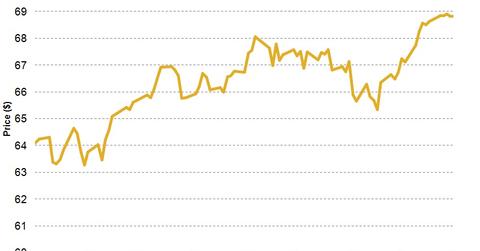Why consumer confidence is an important economic indicator
Consumer confidence is an economic indicator. It measures how confident consumers are about the overall state of the economy. It also measures how confident people feel about their income’s stability. Their confidence impacts their economic decisions—like their spending activity.
Sept. 5 2014, Updated 1:00 p.m. ET

Why is consumer confidence important for an economy?
Consumer confidence is an economic indicator. It measures how confident consumers are about the overall state of the economy. It also measures how confident people feel about their income’s stability. Their confidence impacts their economic decisions—like their spending activity. As a result, consumer confidence is a key indicator for the overall shape of the economy.
Consumer confidence usually increases when the economy expands. It usually decreases when the economy contracts. However, since consumers may not have perfect information, the measure is considered a lagging indicator of stock market performance.
Usefulness of the consumer confidence indicators
Investors, manufacturers, retailers, banks, and government agencies use various consumer assessments to plan their actions. For example, if weak consumer confidence indicates a decline in consumer spending, manufacturers will decrease their inventories in advance. They might delay investing in new projects and facilities. Banks will prepare for a reduction in lending activities like mortgage lending and credit card use. Homebuilders will plan for the decline in home construction volumes. The government will get ready for the reduction in future tax revenues.
On the other hand, if consumer confidence is improving, manufacturers can begin to boost production and inventories. Large employers will plan to increase hiring rates. Builders start preparing for higher housing construction rates. This bodes well for consumer discretionary exchange-traded funds (or ETFs) like the Consumer Discretionary Select Sector SPDR Fund (XLY). The XLY includes companies like McDonald’s Corporation (MCD), Amazon (AMZN), and Nike Inc. (NKE) in its portfolio. Another consumer discretionary ETF is the SPDR S&P Retail ETF (XRT). When confidence decreases, spending and risk-taking tend to decrease.
Other factors that impact consumer confidence
Apart from confidence, consumer spending is also affected by factors like monetary or fiscal policy, inflation, purchasing power, and supply of goods. As a result, investors, businesses, and governments should review economic indicators that are related to these other factors. The economic indicators help to gauge the economy’s overall health.
The question remains, are consumers in the U.S. confident about the economy? We’ll discuss this in the next part of the series.
